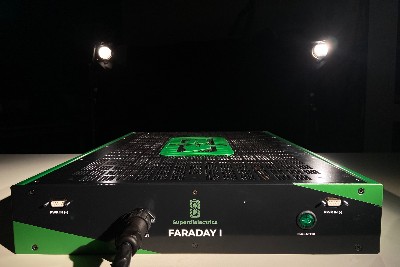University of Bristol: Launch of Breakthrough Energy Storage Technology
A new cutting-edge energy storage technology has been developed by green energy company Superdielectrics Group Plc. This new technology stems from an ongoing collaboration with leading researchers at the University of Bristol who identified and validated the key mechanisms involved.
Superdielectrics’ energy storage technology combines electric fields (physics) and conventional chemical storage (chemistry) to create a new aqueous polymer-based energy storage technology. The Company is today formally launching the Faraday 1, its state-of-the-art hybrid energy storage technology. The technology behind the Faraday 1 has completed over one million hours of testing to create a system that already has the ability to significantly outperform lead-acid batteries and has the potential, with further development, to match or better existing Lithium-ion batteries.
Such systems require economically viable energy storage. The energy storage market is currently dominated by lithium-ion and lead-acid batteries. The Company’s patented new polymer-based energy storage technology solves the issue of dealing with rapidly fluctuating and intermittent renewable energy which makes it difficult to currently store solar and wind energy economically.
The technology behind Faraday 1:
- Aqueous polymer-based technology that solves the issues of storing fluctuating and intermittent renewable energy.
- Highly efficient store of energy that charges over 10 times faster than lead-acid batteries with high cycle life.
- Safe store of energy – negligible fire risk.
- Low costs – uses readily available abundant raw materials.
- Recyclable.
- Huge scale of addressable opportunity with $50bn/year lead-acid battery market including electric scooter, forklift and off grid markets.
Professor David Fermin, Head of the Bristol Electrochemistry and Solar Team and Net Zero Ambassador for the University of Bristol, worked with a team of Bristol engineers, examining the performance of prototype devices and unravelling the mechanisms involved in the storage and release of energy. He said: “It is a privilege to be part of the most exciting technology in the energy sector that I have seen involving our organisation.
“These state-of-the-art supercapacitors have the potential of becoming a game changer in energy storage. Superdielectrics’ devices are not only highly competitive against matured technologies in terms energy and power density, but are also free of critical elements, using earth abundant materials with lower environmental impact than other energy storage technologies. I can see Superdielectrics developing into a major player in this global market, providing safe and affordable sustainable energy for everyone.”
Professor Phil Taylor, Pro Vice-Chancellor Research and Enterprise from the University of Bristol, said: “Superdielectrics’ technology offers a new route to developing a clean energy system.”
Dr Alistair Hales from Bristol’s School of Electrical, Electronic and Mechanical Engineering said: “A key aspect of this technology, in comparison to a conventional battery system, is that they can discharge close to 100% of the charge stored, even in very high power applications and without significant long-term degradation to the performance.”
Senior Lecturer in Electrical and Electronic Engineering at Bristol, Dr Sam Williamson said: “Scalable and safe energy storage systems are required in challenging applications such as grid-balancing services and rapid charging for electric vehicles. The Superdielectrics technology can potentially play a role in these key aspects towards electrification of the energy sector.”
Dr Bethan Charles, a lecturer in renewable energy and a researcher of solar energy at Bristol, said: “One of the exciting aspect of the Superdielectrics technology is the absence of critical materials, as well as the substantially lower environmental impact than existing technologies such as lithium iron phosphate batteries.”
Bristol lecturer in Mecharnical Engineering, Dr Jemma Rowlinson added: “Although a thorough device end-of-life assessment will be required, our preliminary studies suggest that up to 93% of the materials in Superdielectrics devices can be recycled.”
Jim Heathcote, CEO of Superdielectrics, added: “The team at Superdielectrics has worked incredibly hard to develop a ground-breaking technology that has the potential to revolutionise the energy storage market. Our breakthroughs deliver the potential, at last, to create the sustainable, global decentralised energy systems that the world desperately requires.
“The properties that our technology possess enables it to compete with and exceed current solutions in the energy storage arena across a number of key metrics whilst leading the way in sustainability, recyclability and affordability.
“This is a remarkable achievement by all concerned and we now look forward to commercialising our platform and products – we have seen global interest in our technology.”
Professor Marcus Newborough, Director of R&D of Superdielectrics, concluded: “The combination of the benefits of rapid charging and sustainability used for energy storage now make it possible to create worldwide affordable and clean energy systems.
“In the future, the continuing development of our pure supercapacitor technology could surpass all existing battery technologies.”

